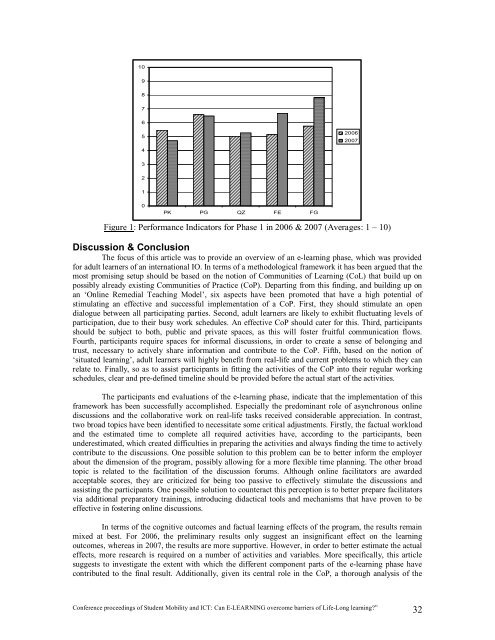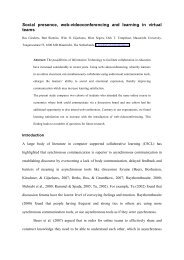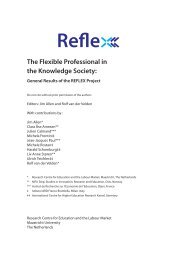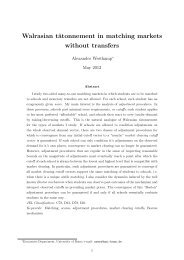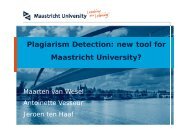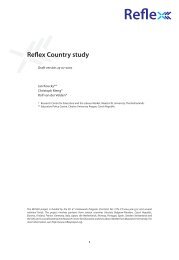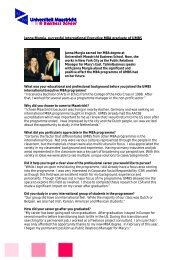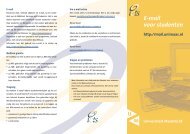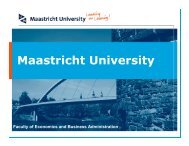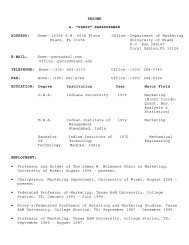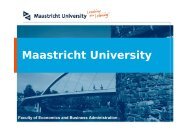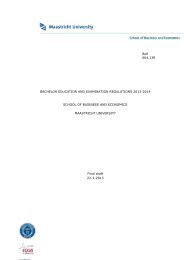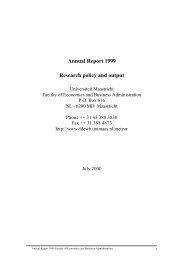proceedings of Student Mobility and ICT: Can E-LEARNING
proceedings of Student Mobility and ICT: Can E-LEARNING
proceedings of Student Mobility and ICT: Can E-LEARNING
Create successful ePaper yourself
Turn your PDF publications into a flip-book with our unique Google optimized e-Paper software.
10<br />
9<br />
8<br />
7<br />
6<br />
5<br />
4<br />
3<br />
2<br />
1<br />
0<br />
PK PG QZ FE FG<br />
Figure 1: Performance Indicators for Phase 1 in 2006 & 2007 (Averages: 1 – 10)<br />
Discussion & Conclusion<br />
The focus <strong>of</strong> this article was to provide an overview <strong>of</strong> an e-learning phase, which was provided<br />
for adult learners <strong>of</strong> an international IO. In terms <strong>of</strong> a methodological framework it has been argued that the<br />
most promising setup should be based on the notion <strong>of</strong> Communities <strong>of</strong> Learning (CoL) that build up on<br />
possibly already existing Communities <strong>of</strong> Practice (CoP). Departing from this finding, <strong>and</strong> building up on<br />
an ‘Online Remedial Teaching Model’, six aspects have been promoted that have a high potential <strong>of</strong><br />
stimulating an effective <strong>and</strong> successful implementation <strong>of</strong> a CoP. First, they should stimulate an open<br />
dialogue between all participating parties. Second, adult learners are likely to exhibit fluctuating levels <strong>of</strong><br />
participation, due to their busy work schedules. An effective CoP should cater for this. Third, participants<br />
should be subject to both, public <strong>and</strong> private spaces, as this will foster fruitful communication flows.<br />
Fourth, participants require spaces for informal discussions, in order to create a sense <strong>of</strong> belonging <strong>and</strong><br />
trust, necessary to actively share information <strong>and</strong> contribute to the CoP. Fifth, based on the notion <strong>of</strong><br />
‘situated learning’, adult learners will highly benefit from real-life <strong>and</strong> current problems to which they can<br />
relate to. Finally, so as to assist participants in fitting the activities <strong>of</strong> the CoP into their regular working<br />
schedules, clear <strong>and</strong> pre-defined timeline should be provided before the actual start <strong>of</strong> the activities.<br />
The participants end evaluations <strong>of</strong> the e-learning phase, indicate that the implementation <strong>of</strong> this<br />
framework has been successfully accomplished. Especially the predominant role <strong>of</strong> asynchronous online<br />
discussions <strong>and</strong> the collaborative work on real-life tasks received considerable appreciation. In contrast,<br />
two broad topics have been identified to necessitate some critical adjustments. Firstly, the factual workload<br />
<strong>and</strong> the estimated time to complete all required activities have, according to the participants, been<br />
underestimated, which created difficulties in preparing the activities <strong>and</strong> always finding the time to actively<br />
contribute to the discussions. One possible solution to this problem can be to better inform the employer<br />
about the dimension <strong>of</strong> the program, possibly allowing for a more flexible time planning. The other broad<br />
topic is related to the facilitation <strong>of</strong> the discussion forums. Although online facilitators are awarded<br />
acceptable scores, they are criticized for being too passive to effectively stimulate the discussions <strong>and</strong><br />
assisting the participants. One possible solution to counteract this perception is to better prepare facilitators<br />
via additional preparatory trainings, introducing didactical tools <strong>and</strong> mechanisms that have proven to be<br />
effective in fostering online discussions.<br />
In terms <strong>of</strong> the cognitive outcomes <strong>and</strong> factual learning effects <strong>of</strong> the program, the results remain<br />
mixed at best. For 2006, the preliminary results only suggest an insignificant effect on the learning<br />
outcomes, whereas in 2007, the results are more supportive. However, in order to better estimate the actual<br />
effects, more research is required on a number <strong>of</strong> activities <strong>and</strong> variables. More specifically, this article<br />
suggests to investigate the extent with which the different component parts <strong>of</strong> the e-learning phase have<br />
contributed to the final result. Additionally, given its central role in the CoP, a thorough analysis <strong>of</strong> the<br />
Conference <strong>proceedings</strong> <strong>of</strong> <strong>Student</strong> <strong>Mobility</strong> <strong>and</strong> <strong>ICT</strong>: <strong>Can</strong> E-<strong>LEARNING</strong> overcome barriers <strong>of</strong> Life-Long learning?” 32<br />
2006<br />
2007


